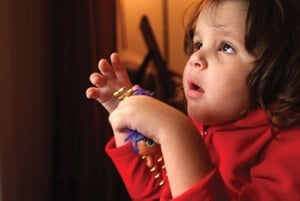Drama & Autistic Children

Before I start, I'd like to say that I'm not an expert in autism by any means. However, over the past 15 years, I have taught a great many children on the Autism Spectrum so I have seen firsthand how autistic children can benefit from the kind of games and exercises we do at Perform.
My first experience of working with a child with autism did not go smoothly - largely because the parents hadn't told me he was autistic (something which is more common that you might expect). They desperately wanted him to do drama but were worried that I would not want to have him in the class after he had been judged as too disruptive by several other schools.
This little boy would not listen to any instructions, would not make any eye contact with me and simply ran around and shouted out all the time. Since he didn't respond to any of my normal techniques and wouldn't stay within ?class boundaries?, I knew that something was up. I had many conversations with his parents giving them every opportunity to be open with me but it was a few painful weeks before they finally told me that he was autistic.
Once I knew this, I did some research, spoke to his school teacher and we started to make real progress. For example, he found making eye contact extremely difficult but this improved enormously when he was pretending to be someone else and in ?character'.
These days, parents with children on the autism spectrum are often encouraged to bring their children to drama classes as it can really help to develop their social skills. While the field of Drama Therapy for autism is still quite new and there are very few experts, those that I have spoken to all believe that mainstream drama teachers have many of the skills required to help.
In particular, I have seen drama games be very effective at helping autistic children:
- Improve self confidence
- Recognise emotions in others
- Identify their own emotions
- Work as part of a group
- Follow directions and instructions.
Often, autists are verbal but don't have the skills to speak and interact socially. Sometimes, they repeat other people's words verbatim and children with autism can often recite speeches and dialogue in exactly the same way as the original. Drama can give verbal individuals a safe setting for developing these skills and this is what we do in every Perform session.
I remember one little girl I taught who had very poor communication with her peers and teachers. Her parents brought her to my class with a written report into her background, how she reacted to different situations and how best to deal with her effectively. Despite this comprehensive document, nobody had mentioned that she was an incredible singer. Once she was singing in character, she could communicate beautifully. We decided to work intensively with her on this and, bit by bit, her daily life at school and with her family started to improve.
I know from talking to parents that having an autistic child can be challenging and emotional but, in my view, the most important thing a parent can do is to be open, honest and transparent about their abilities and difficulties as early as possible. My first experience was so hard because I didn't know that the child was autistic and my reactions to his behaviour were wrong. Once I knew, I was able to use different and more suitable approaches which were much more successful.
Not all autistic children are suitable for mainstream drama classes like Perform of course, but by seeking advice at the earliest opportunity and by being open with the teachers, the child stands the best chance of getting the support and opportunities they deserve. If you know or care for an autistic child, you might also consider our small group or one-on-one classes Private Perform which can be specially designed around the needs of an individual child or group.










 Recent Posts
Recent Posts Recent Comments
Recent Comments
 Archives
Archives

Leave a comment
Do you have any classes in South Wales??
Thanks. Laura
X
I have recently been appointed as Performing Arts teacher at a special school for children with Autism. It's my first role out of the standard classroom in seven years and, after not teaching drama for that long, I'm a little bit rusty.
I teach children across the spectrum, from children with excellent skills and understanding, to children who require intensive therapy. Do you have any drama based games you can suggest that can cover all my bases (so to speak)?
Do you mean some drama based games? I can certainly suggest some for you.
It was great to read your article. I’am a theater teacher by profession and I teach in a school which follows inclusive education. I have a boy in my class who is diagnosed with ASD and he is 8 years old. He rarely makes eye contact and uses very few words to communicate. And since it’s an inclusive classroom a special curriculum has been made. I would really appreciate if you could suggest few theater or any group activity to help him.
Thanks in advance! :)
We have now signed up for the term :-)
I have booked my son in for a trial class in our local town next week and, if a class is too much for him, we’ll look to organise something specific.
I am very up front about my son’s autism, and have added it to his notes so that the leader understands his issues, but I can empathise with parents who don’t want to admit it. I’ve had the leaders of classes simply refuse to have Harry in the class SIMPLY because I’d mentioned his autism. Before they had ever met him, they had judged him and written him off. Equally, there are parents who don’t want their child mixing with an autistic child and will cause problems if they know an autistic child is joining the class.
It, too, happens more than you think which is why a lot of parents of autistic kids keep quiet about it!
Anyway, let’s hope for a successful class!
Karen Bower
I was delighted to find your blog when I googled 'drama classes for children with autism' as it seemed to be exactly what I have been searching for. My 4 year old grandson has an ASD diagnosis and is very similar to the child you described- only sometimes makes eye contact, runs around without obeying instructions and shouts - so I that there was a good chance he would be able to join Perform.
I was extremely apprehensive when I was told that he would have to join the class unaccompanied right from the beginning, but followed the suggestion that he 'come along and try'a first session we attended in Hildenborough at 4.00 p.m. On 14/1/14
The very pleasant girl who ran the class told me that Samuel would be allowed to try, but that he if he couldn't join in with the class he would be asked to leave. I was allowed to do the initial few minutes with him and then asked to leave. Obviously(as I could see through the door) Samuel had no idea what he had to do and was very confused. As your blog acknowledges, a chid on the spectrum finds group activities and following specifis instructions, very challenging if not given the right support.
Within 5 minutes he was brought out of the room. I was told he would disrupt the class if he stayed. I took home a disappointed and confused little boy.
My point is not that should have been allowed to stay, as clearly it was not the right environment for him., but that I eas totally misled by your blog which suggested that your classes were inclusive and set up to encourage and enable children such as Samuel to experience a drama club.
With best wishes. Angela Cockburn